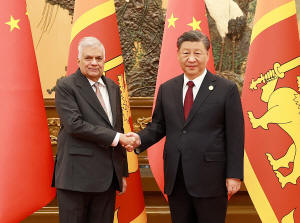|
The
previous guidelines date from 2019, before indebted nations such
as Sri Lanka and Zambia defaulted on their loans and appealed to
Beijing to restructure their debts.
The new guidelines, released after this week's third Belt and
Road Forum, halve to 10 years the time Chinese financial
institutions and those of other BRI nations "are encouraged" to
use in making macroeconomic projections, leading to a more
prudent approach in assessing growth risks.
The changes also broaden the guidelines to "BRI market access
countries" in the program from just "BRI low-income countries",
boosting eligibility to use Beijing's preferred framework when
seeking financial support.
Expanding this definition should bring into the fold
"middle-income" countries such as crisis-hit Sri Lanka, which
has been seeking debt restructuring assurances from China
similar to those available to "low-income" countries via the
G20-led Common Framework.
The world's largest bilateral creditor, Beijing has long wanted
multilateral lenders such as the International Monetary Fund and
World Bank to share with it their debt sustainability analyses
of those seeking debt restructuring, if they expect China to
offer debt relief.
China's loans to lower and middle-income countries were worth
$170 billion by the end of 2020, World Bank data shows.
The guidelines also drop a clause "welcoming the efforts of the
IMF, World Bank other international institutions to improve debt
sustainability of the low-income countries".
Instead they now urge all BRI countries to adopt the new
framework, suggesting Beijing wants to continue talks with
debtor nations on a two-way basis, despite the Common
Framework's aim to standardise access to debt relief.
(Reporting by Joe Cash; Editing by Clarence Fernandez)
[© 2023 Thomson Reuters. All rights
reserved.]
This material may not be published,
broadcast, rewritten or redistributed.
Thompson Reuters is solely responsible for this content.

|
|




